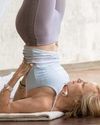A strong, supportive bottom is key to a safe, pain-free practice. Here’s what you need to know about the gluteus maximus, medius, and minimus muscles; why our sedentary lifestyles are overstretching them; and how to use your yoga practice to balance your backside.

For many people, appearance is the top priority when it comes to their posterior. But yoga practitioners also know that the gluteals can do so much more than look great in jeans: They’re the primary players in many of the movements that make it possible to do yoga. The gluteus maximus, medius, and minimus—along with many other smaller, supporting muscles—act as a base of support for the pelvis and hips. What’s more, these hardworking muscles stabilize your femur (thighbone) in your hip socket, rotate your femur internally and externally, and draw your leg back. And yes, all of these actions also help us stand and walk, and even support us when we sit.
Unfortunately, there are a number of ways we jeopardize the health of this important muscle group. For starters, our increasingly sedentary lifestyles are leading to what experts call “gluteal amnesia,” in which the butt muscles become overstretched and underused (read: weak). On the flip side, it’s also possible to overuse and overexert these muscles— whether we’re excessively clenching the tush in certain asanas, such as Warrior Pose II or Wheel Pose, or pushing too hard while running or hiking. Not only do under- or overworked glutes affect range of motion in the hips and sacrum, but strength imbalances can also lead to instability or pain when we’re on our mats. Here’s how to find a happy medium.
BODY OF KNOWLEDGE: ANATOMY OF THE GLUTEALS
GLUTEUS MEDIUS
Esta historia es de la edición June 2017 de Yoga Journal.
Comience su prueba gratuita de Magzter GOLD de 7 días para acceder a miles de historias premium seleccionadas y a más de 9,000 revistas y periódicos.
Ya eres suscriptor ? Conectar
Esta historia es de la edición June 2017 de Yoga Journal.
Comience su prueba gratuita de Magzter GOLD de 7 días para acceder a miles de historias premium seleccionadas y a más de 9,000 revistas y periódicos.
Ya eres suscriptor? Conectar

Learning to Hear the Voice of Self-Care
How to discern what really matters.

Inclusive Yoga for All
A Down syndrome diagnosis set this family on a path to make yoga accessible to everyone.

For the Joy of Practice
Doing yoga without attachment to the outcome can bring unexpected gifts.

Be Kind to Your Spine
Your vertebral column is a series of complex, interconnecting parts that support your every movement. Here's how to keep it safe.

A Skeptic of Chakra Balancing
The experience helped me make peace with things that can't be explained.

Are We Having Fun Yet?
Bring play back into your practice with three styles of yoga that can get you out of your head and bring a smile to your face.

12 Ways to Use Blocks You've Probably Never Tried Before
The beauty of blocks? They not only meet you where you are in your practice, they take you beyond where you ever thought you could go.

THE SCIENCE OF AWE
THOSE MOMENTS IN LIFE THAT STOP YOU IN YOUR TRACKS IN ASTONISHMENT? RESEARCH SAYS EXPERIENCING MORE OF THEM CAN CHANGE YOUR LIFE.

What Your Doshas Say About Your Dharma
Ayurveda can explain so much more than what's out of balance.

The Future of Yoga
Yoga has been evolving for thousands of yearsfrom a mind-and-body spiritual practice to a billion-dollar "lifestyle" practice. What's next? We asked futurists, teachers, and thinkers what to expect in the next decade and beyond.